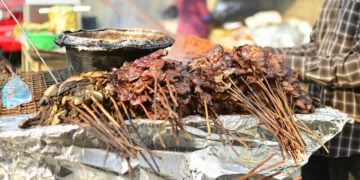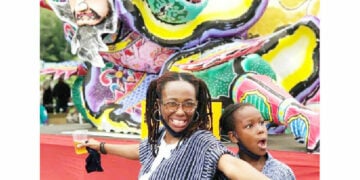Speaking through an interpreter, Aisha said, “I only visited the hospital during last delivery of a set of twins but unfortunately, one of the twins was still birth but the other one is healthy and he is one old already.”
For Aisha, giving birth at home is no longer an option.
LEADERSHIP findings in the community revealed that even though the PHC in the community was provided by the state government and has been functional for years, several factor, including trecking long distance from far villages to the facility, lack of trained health care personels, equipment hindered many women from accessing antenatal and immunisation services in the community.
However, the the EU-funded Maternal, Newborn and Child Health (EU-MNCH) programme, which is ongoing in three Northern States, including Bauchi, is
changing the narrative, as child mortality is becoming a thing of the past in the community, according to the residents.
The intervention, which include renovation of the facility, training of health workers and provision of basic equipment has also addressed the need of transportation fair for the women through the EU/UNICEF Conditional Cash Transfer programme.
“We use to bury our children like chickens in this community before the EU and UNICEF intervention came,” these were the words of the villagers during a visit to the community recently.
The Deputy Chairman, Ward Development Committee (WDC), in the community, Baidu Liman, thanked the EU and UNICEF for the intervention, saying that before the commencement of the programme, the community was recording serious child mortality.
“If you go to our grave, you will see plenty of graves fo children during birth. Through the EU/UNICEF programme, the facilitators have been trained on how to handle maternal care. So the issue of child mortality is becoming a thing of the past in this community. If you go to our primary schools now, you will see most of the children now are healthy for learning system as a result of this programme,” he said.
With this intervention, the women receive the sum of N1,000 each whenever they go for antenatal and immunisation.
The N1,000 incentive, according to the PHC Facility in Charge, Amina Mohammed, has encouraged the women and helped improved maternal and child health in the community.
“Pregnant women are expected to access antenatal service four times before delivery, immunisation immediately after delivery and four other times, making five times. From the money provided by the EU, we give them N4,000 for the four antenatal visits, N4,000 during delivery and N4,000 for the four subsequent immunisation visits, making 12,000,” she explained.
Speaking further, Amina said that before the inception of the intervention, we use to receive few women a week but since the inception of the programme, we now receive over 100 people in a week.
She, however, regretted that some of the women don’t come for complete immunisation despite the money. “We usually educate them on the need for them to complete it and collect their money but only about 80 per cent of them come to the end.”
Aside improving maternal and child health, the incentive has also helped empowered the women economically.
For Hauwa Usman, 35 years old mother of six, she gave birth to three of her children in the hospital and she got money for only one because as at when she had the others, the programme had not commenced yet.
According to her, “I saved the money since my house is not far from the facility and there was no need of me spending the money on transportation. The money amounted to N12,000, I used it to buy chickens and then later sold them and bought a goat with the money. Now I have two goats.”
While Hauwa has invested her money into Poultry business, some other women said they used their own to buy food stuff and baby things since their husbands don’t give them enough money.
On family planning, the Facility in Charge said “We use to write down the days that we give them health talks. Some of them begin to access family planning immediately after birth, about 60 per cent of them accesss family planning but the remaining 40 per cent said their husbands will not allow them to.
“We also advise them to breastfeed optimally as it serve as a form of family planning.”
She also said that for some reasons, some of the women will not like to admit in public that they are accessing family planning. “Some of them don’t like to come to the facility but they confide in me, even they change their names and address when they come for family planning.”
According to Baidu, “All my wives are on family planning. Many people have now understand the importance of family planning. before if you talk about family planning, peple will jus think that you don’t want them to give birth but with explaination, men and women now understand that family family is just to get a gap but not stoping them from giving birth.
Sharing his personal experience, he said “Before I got to know about family planning, I had two children within two years but since I got this enlightenment, my children now have six years gap. Even our religion allows family planiing, it is only those people who do not know the religion that misinterpret it. we are still preaching and telling them what family planning is all about during marriages and during Islamic gathering.”
The deputy chairman, however, identified low participation of the women in the facility as a major challenge.
“Most of them are not interested in coming to the facility as at when due. We organise many lectures for the communities to address the people. We have 33 villages using this particular facility. during our enlightenment programmes, we do it for both men and women, we tell them about the importance of coming to the hopstial,” he states.
Speaking on the conditional cash transfer, he said that the money motivates the women because they use it to purchase some drugs, fruits, etc. “We men are supposed to take care of that one but when you give them that money, it helps a lot”
The Community Head, Ibrahim Sirki, who was visibly happy, thanked the orgsnisations for the intervention, saying that the entire people of the community have benefited from the programme and are thankful.
Sirki, who said he had lost seven of his children before this programme said “Before we have a lot of dead babies but since this programme commenced, you will hardly hear that a child dies. Our wives and children are now healthy.”
During a visit to the Office of the Deputy Governor of the State, the Deputy Governor, Senator Baba Tela, acknowledged that the the state would not have been able to achieve half or even quarter of what it has achieved i the area of primary healthcare and to some estent even the secondary healthcare, without the EU/UNICEF intervention.
Sen. Tela pleaded for further extention of the programme, which would have ended in August 2020 but extended to 2021, saying that the state have 323 wards, and intends to have at least one PHC in each of the ward. “I will kindly want to pleeed with you to extend the programme,” he said.
In his words, “I will start by appreciating our donors, we would not have been able to achieve half of what we have or even quarter in the area of primary healthcare to some estent even the secondary healthcare because when you have good primary healthcare system, that takes off a lot of preasure from the secondary healthcare system. we appreciate the EU, we appreciate UNICEF.
“As we are meant to understand, you are renovating aout 107 healthcare. for you to be able to function very well, the environment must be condusive , what I am going to reguest, what I am going to ask our partners to do is to extend the period, it would have expired as you said August 2020, it is now extended to 2021. I am not sure that we are now in a very good state to take over. It is just now that we are seeing the importance and we are reaping the benefits of the intervention, we will come looking for extention beyond 2021. we have 323 wards, we want to have at least one PHC in each of the ward.”
He, however, informed that the state has been faithful in disbursement of counterpert fund.
Also, the Emir of Dass, Alhaji Othman Bilyaminu, during a visit to his place, said that he inherited health inclusion (family planning) from his father who also fought for health progress.
He thanked the state government for paying it’s counterpart fund for the health indices of the state.
Despite the level of achievement, Kafin Sule community as there is no car or ambulance in the entire community to take a patient to a secondary health facility the city in case of an emergency.
On this, Liman said they have written to the state development board to get a small ambulance. ” we are hoping to get response from them soon,” he said.
There is the need for government to take ownership of the programme for sustainability purpose.





